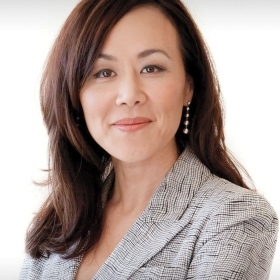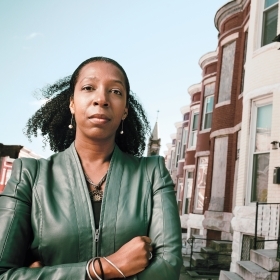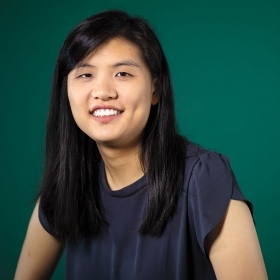Alina Ball ’03
As a professor and founding director of the Social Enterprise and Economic Empowerment Clinic at University of California Hastings College of Law, Alina Ball ’03 weaves social and economic justice with corporate transactional law.

Photo by Jim Block
Throughout her academic and professional careers, Alina Ball ’03 has turned to Wellesley alumnae to buoy her up. It’s been a pattern since she was in high school at Cranbrook Kingswood, a Michigan boarding school, when her two older student mentors headed off to Wellesley. Her decision to attend herself was cemented after visiting them for an overnight stay.
Now, as a professor and founding director of the Social Enterprise and Economic Empowerment Clinic at University of California Hastings College of Law, Alina weaves social and economic justice with corporate transactional law. While the two fields are seemingly disparate, she says that her time at Wellesley gave her early experience with juggling divergent passions and finding ways to use both in service of the greater good.
At Wellesley, Alina majored in mathematics and Spanish, and distinctly remembers experiencing difficulty finding peer support in her math courses. During her four years, there were no other Black or Latina math majors in the department. “In upper-level math classes, it’s so labor intensive that you need a study partner, but I couldn’t get anyone to be my partner,” she recalls. “I was just sort of a misfit in class.”
Professor Stanley Chang offered to be her study partner and used his office hours as a time for them to work together. “I would not have gotten through this math major without someone like him,” Alina says. Chang, along with other professors, helped her develop the resilience, perseverance, and confidence that she uses in her work today.
Meanwhile, her coursework for her Spanish major began to fine-tune her interests in public policy and social justice. Classes like Latin American Feminists and Latin American Culture and Society and courses on public health introduced her to issues she wanted to understand more deeply.
In addition, “Being in Boston helped me think about how issues of race, space, and power come together,” Alina says. “Of course, geographic segregation is everywhere in the United States, but you can tangibly see it in Boston. Being able to see that in the context of a super-supportive educational experience that was trying to get me to think deeper about society and what my role in it would be, ended up being the melting pot where I was asking a lot of these questions.”
Two years after graduation, Alina headed to law school at UCLA. “When I was picking law schools, it was not lost on me that Cheryl Harris, who was somebody I was super excited to work with as an incoming law student, was a Wellesley alum,” Alina says. (Cheryl Harris ’73 is a critical race theorist and professor of civil rights.) “The first day I met her I was a One-L, and she walked up to me and whispered, ‘Welcome to UCLA, alumna.’”
The memory is one Alina cherishes. Throughout her time at UCLA, she took several courses with Cheryl, including critical race theory classes that she integrates into her work at Hastings. Alina and her students advise clients and businesses that create positive social or environmental impacts to assist them with a variety of corporate governance, compliance, transactional, and operational matters. The majority of the businesses operate in economically marginalized communities, and many are owned by people of color.
“We have a vision of economic empowerment, where regardless of what neighborhood you live in, what language you speak, what ethnicity you are, your immigration status, you will have the right to live in a neighborhood where you can work, get services, and be able to accumulate wealth,” Alina says. “While the work we do isn’t always explicitly racial justice work, racial justice is a big part of the social justice work that we’re doing.”


